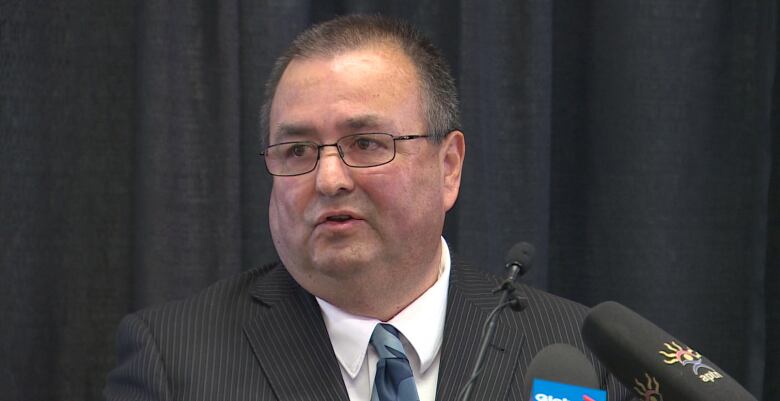Mi'kmaq Grand Council flag symbol of change, acceptance for Indigenous Nova Scotians
Seeing the flag raised in the province unlikely 5 or 10 years ago, says Atlantic Policy Congress member

DalhousieUniversity professor Patricia Doyle-Bedwell remembers when she first saw the Mi'kmaqGrand Council flag flying on campus.
Five or six years ago,Doyle-Bedwellsaid the flag was hoisted in the quad for about half an hour.
"We wanted it for the month of October.Buteven for that half hour, it was breathtaking and emotional," said the Mi'kmaqlawyer and educator.
"It's a symbol for me of the change, of the acceptance of our presence and the acknowledgement of our history and the need to incorporate us into education. Because we need to see ourselves in the textbooks, in the classes, as teachers as students, our history, our elders and that to me is what the flag symbolizes."

More than marking a month
In recent years, the flag has been flown by some organizations and educational facilities during October to mark Mi'kmaq History Month.
Now universities across Nova Scotia have gone a step further. Allhave announced in recent months that they are making the flag a permanent part of their campuses.
That would have been unheard of five or 10 years ago, said John Paul, executive directorof the Atlantic Policy Congress of First Nations Chiefs Secretariat.
"The flag was never given that significance across Nova Scotia, across Atlantic Canada."
Reflects change
He believes the flag is an important education aid, as well as a cultural symbol.
"I always think about little kidsasking that question, what is that flag there for?" said Paul.
"They recognize Canada and the provincial flag but when they see that flag, they'll say what's that doing there and that's what you want. You want people to be educated, informed that we were the first people here."

For Doyle-Bedwell, the Mi'kmaqGrand Council flag also represents a public acknowledgement of Indigenous presence, both past, present and into the future.
It's also personal, reflecting the changes that have been made at Dalhousie over the past 30 or so years that she has been there.
"When I came here as a student there were hardly any books [about Indigenous peoples] in the library. There were just five of us in the SUB [Student Union Building]. Now we have a core group of Indigenous faculty. We have over 300 Indigenous students here. We're flying our flag."
Indigenous input
In addition, the university has agreed to officially acknowledgethat it sits on traditional Mi'kmaqterritory, addingthe reference to academic documents.
Dalhousie also is working on an Indigenous strategythat includes degrees in Indigenous studies at undergraduate and graduate levels and Indigenous input intovarious faculties, Doyle-Bedwellsaid.
"The Indigenous strategy is a plan and it's a significant plan.Dalhousie medical schoolhas also hired an Indigenous advisor and recruitment person. We have a new Indigenous student advisor. That's all within the last five years."
'Every municipality, every school'
Paul wishes the flag was being raised in other areas as well.
"Every municipality, every school, wherever they fly a flag basically.It recognizes that we were here, a very important recognition. Where you're from most people have a flag to say where you are from."
Right now he said, it is "really up to the goodwill of the leaders 'thought leaders'in particularof universities and cities and towns," said Paul.
"I am glad they are seeing this as the right thing to do. And I'm very happy when I see it it just gives me a confidence about who we are."












_(720p).jpg)


 OFFICIAL HD MUSIC VIDEO.jpg)
.jpg)



























































































